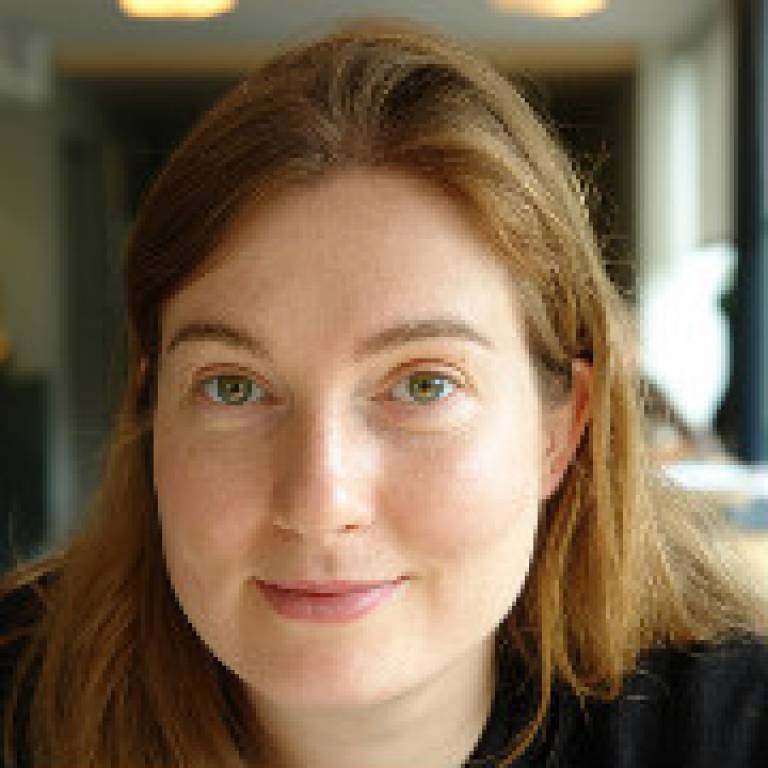Spotlight on Dr Melissa Terras
6 January 2012
This week the spotlight is on Dr Melissa Terras, Reader in Electronic Communication, Department of Information Studies and Deputy Director, UCL Centre for Digital Humanities.

What is your role and what does it involve?
I am the
Reader in Electronic Communication in the Department of Information Studies,
and the Deputy Director of the recently founded UCL Centre for Digital
Humanities.
I teach various courses on Internet
Technologies and Digital Resources in the Humanities. My role also involves interdisciplinary research between computing and engineering
sciences and the humanities, and looking at how digital techniques can be
applied to humanities issues to allow research that would not have been
previously possible.
As such, I work on a variety of exciting interdisciplinary projects in often large research teams, and currently jointly supervise PhD students with Computer Science, Medical Physics, Geomatic Engineering and Archaeology.
I've recently been appointed as one of the Knowledge Transfer Champions in the Arts and Humanities at UCL, which formalises this interdisciplinary role somewhat, while enabling me to involve industrial partners on a wider level to see how we can do novel research in digital humanities that can have a wider impact beyond academia.
Digital humanities is a really fast growing field and there is a lot of interest in
both how we can build computational systems to aid research in the arts,
humanities and cultural and heritage sector, and how we can study the
implications of using such technologies in the arts and humanities.
I really
enjoy my multifaceted role at UCL and partaking in the wider digital
humanities community. I am currently one of the general editors of Digital
Humanities Quarterly Journal, Secretary of the Association of Literary and
Linguistic Computing, on the editorial board of LLC: the Journal of Digital
Scholarship in the Humanities...the list goes on.
It's a busy role, but there is a real feeling that digital humanities has come of age at the moment and it's exciting to partake in such a flourishing field.
How long have you been at UCL and what was your previous role?
I joined UCL in 2003. My academic trajectory is somewhat unusual. My
undergraduate degree at the University of Glasgow was in History of Art and English
Literature. In my final year (1996/7), we had the opportunity to submit our
dissertation as a website, rather than in a traditional academic form, and I first
got my taste of computing, which I had never really encountered before.
I then
undertook a one year master's conversion course in Information Technologies in
the Computing Science Department at Glasgow and gained a Distinction in
Software and Systems.
Shortly after graduating, I joined the Engineering
Department at the University of Oxford to work on a joint project with the
Centre for the Study of Ancient Documents on imaging and understanding Roman
documents from Hadrian's Wall.
I graduated with my DPhil in engineering in early 2003 and, for almost year, I worked as an Assistant Manager in the Policy Department of the Royal Academy of Engineering, advising the government on science and technology.
At that time, there were few openings in humanities computing, as it was
then called, and I was reconciled to the fact that I wouldn't be able to have an
academic career.
When the job at UCL came up, I thought I might as well apply, but
I believed I had little hope of getting it, given the stiff competition!
I have been very happy at UCL since and enjoyed the opportunities that have been given to me - rapidly being promoted from probationary lecturer to Senior Lecturer and now Reader.
What working achievement or initiative are you most proud of?
It's very difficult to choose when you work on so many different
projects. For example, at the moment we are having a lot of fun with Transcribe
Bentham, which is a joint project between UCL Laws and various other partners
across UCL to use crowdsourcing to aid in the transcription of Jeremy
Bentham's handwritten manuscripts, held in UCL Special Collections.
The project has been a roaring success, and we have been nominated - and come runner up in - two major international prizes.
I'm very much enjoying the work we're doing at UCL on digital imaging
of documentary material, including bench-marking multi-spectral techniques, and
developing techniques to aid in reading damaged and deteriorated texts.
We are gathering together a strong Interest Group on this, across various teams, and I'm finding this very personally rewarding to work on, as my knowledge of image processing is being brought up-to-date pretty sharply.
I have a variety of other PhD students working on user studies of digital resources and the use of various digital media in museum spaces, as well as online community archaeology and the history of the early blogosphere. I learn a lot from my PhD students and it is a privilege to work with them at this stage in their careers.
Finally, I've been instrumental in helping set up the recently founded
UCL Centre for Digital Humanities and our new cross-disciplinary MA/MSc in
Digital Humanities.
It has been very exciting working in a team which is helping to embed digital humanities within UCL's infrastructure, and helping as many people as possible exploit their research and teaching ideas. If anyone needs help with digital humanities teaching or research, you know where to find us!
What is your life like outside UCL?
Rather hectic. I'm married and we have a three-year-old son and one-year-old twin sons, so although my working day is very busy, it feels like a rest in comparison! I have little time at the moment for anything else other than work and home life, but that is just the phase we are in right now: it's all good!
 Close
Close

